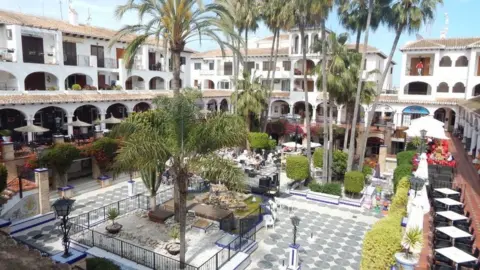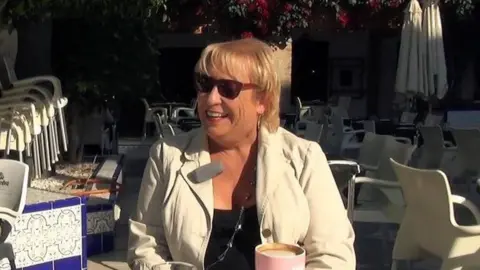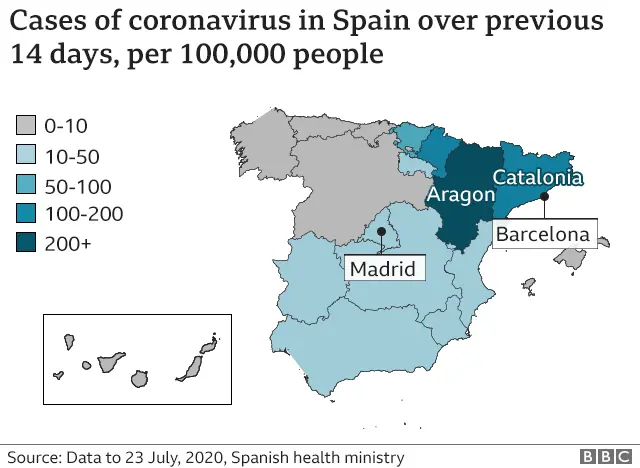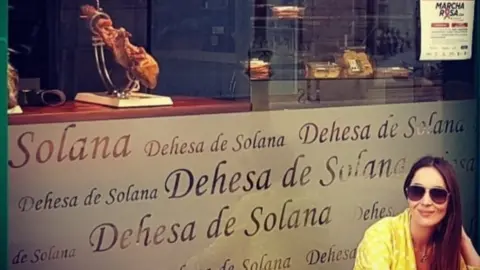Spain quarantine rules: The businesses fearing for their futures
 BBC
BBCThe bars and restaurants which line the square in Villamartin had begun to breathe a sigh of relief.
The coronavirus pandemic which had kept the tourists away for the first part of the summer seemed to be easing, and the - mainly British - visitors were returning to this little spot on Spain's Costa Blanca.
But the feeling of relief was far too short lived: on Saturday, the British government announced it was imposing a two-week quarantine on those returning from Spain. The calls asking to cancel began to pour in almost immediately - after all, many holidaymakers cannot afford to take another two weeks off, especially with the potential of them being unpaid.
For the businesses around the plaza though, the reality was the rule change was not just ruining their summer holidays. It has the potential to cripple their livelihoods too.
"Everybody here is just panicking - we were just getting back on our feet," Casey Shaddock, president of the Villamartin Plaza, told the BBC. "Normally, this square would be buzzing - we hold 1,400. On summer nights we do live music, we bring a lot of acts across from England.
"Now, it is just the birds chirping."
 Casey Shaddock
Casey ShaddockThe UK government's surprise announcement was made amid rising case numbers in Spain. It now advises against all non-essential travel to Spain, including the Balearic and Canary Islands. Holiday companies Jet2 and Tui have cancelled swathes of flights as a result of the order.
But Spain's rising cases are mainly confined to certain areas - notably, Catalonia and the ever-popular tourist destination, Barcelona - leading the country's Prime Minister Pedro Sánchez to describe the Spain-wide order as "unjust".
For many business owners - especially those reliant on some of the income generated by the 18m trips made by Brits to Spain every year - his choice of words rang true.
"We have less than 200 cases in the area - it is safe here," Ms Shaddock says. "The rules that have been put in place are so strict. The police will close you if you do not follow them."
Near Cáceres, a Unesco heritage spot in the west of Spain, the feeling of confusion is just as strong.
"It has been a surprise," Sonsoles Peyro tells the BBC. "Now we were kind of happy, we were in a normal way - we had started receiving tourists again. We do not really understand the reason why it is the whole of Spain, when you only have some problems in Catalonia."

Luckily for Ms Peyro, a drop in tourist numbers is not such an immediate problem: Dehesa de Solana, the family-run farm where she works, does welcome some tourists - it has rooms and offers tours of its factory - but its main product is Iberico ham.
However, the area's restaurants and hotels do rely on those who come to enjoy the walled city and surrounding nature parks, which are particularly popular with British birdwatchers.
"We always get a lot of emails from travel companies asking to come to visit us. The last few weeks I had had a lot, I was starting to receive some emails - now they cannot come.
"If they do not come to see me, they do not sleep in any place, they do not eat in any place."
And if that happens, there will still be a knock-on effect: "If the restaurants do not buy, then for some parts of our business it will be a problem. If I do not sell the products, if the mother pigs keep having babies, I have to do something - I need to feed them, I need some money. And that money comes from selling products."
 Sonsoles Peyro
Sonsoles PeyroIn the capital Madrid, Fernando Cuenllas is more forgiving of the UK decision.
"My personal feeling would be more worried than angry. It is a very unique situation - nobody really knows how to react. We can blame something things on some people, but I do not think it is simple."
But Mr Cuenllas' restaurant, Media Racion, does not rely directly on the tourist trade. Yet even without the blow of the new quarantine rules, he admits things are not easy. "We are seeing a lot of people scared of going inside restaurants. We are down at 30 to 40% with our bookings."
"I was very optimistic in the beginning," he adds. "To be honest, now I am starting to be more negative. People are starting to get really, really worried. The hotels are getting a lot of cancellations. People on the coast are also getting a lot. So, it is a hard situation."
Back in Villamartin, there is rising anger. Some business owners suggest the UK government's move was more to do with trying to kickstart the British tourism industry and help an ailing economy than stemming any second wave.
"Spain is the most popular place for Brits to go on holiday," restauranteur George Taylor notes.
UK Prime Minister Boris Johnson has defended the decision, saying the government had to "take swift and decisive action where we think the risks are starting to bubble up".
Mr Taylor is no longer looking forward to August. He opened his second restaurant in the town last year, he says, noting with a dry laugh that it may have been the wrong thing to do.
"This rush of people is going to be short-lived," he tells the BBC. "We are okay at the moment for the next week, week-and-half - but it is all the people deciding not to come out here because they are worried."
"The problem is people who were coming out cannot," agrees Ms Shaddock, who estimates she could lose thousands of euros in commission from her rental business in August. "If the quarantine does not get lifted, there will be a lot of places go out of business. We have got a tremendous amount of bars and restaurants - they all feed off each other.
"They are small businesses that support families."
"The people who are actually affected are your working class," Mr Taylor points out. "These are the people who are losing their jobs."

- A SIMPLE GUIDE: How do I protect myself?
- IMPACT: What the virus does to the body
- ENDGAME: How do we get out of this mess?
- WITHOUT SYMPTOMS: The mystery of 'silent spreaders'

